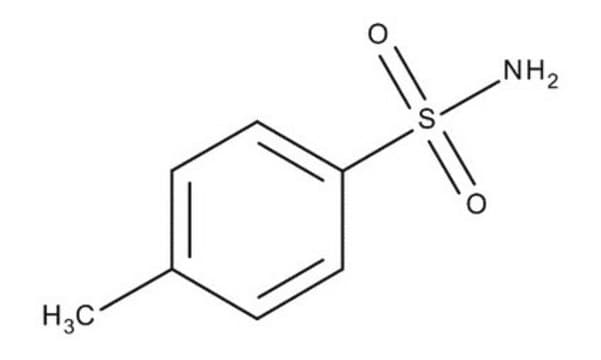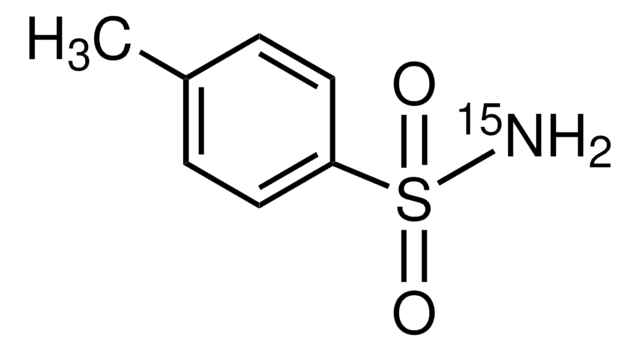257990
o-Toluenesulfonamide
99%
Synonym(s):
2-Methylbenzene-1-sulfonamide, 2-Methylbenzenesulfonamide, 2-Methylbenzenesulfonimidic acid, 2-Tolylsulfonamide, Toluene-2-sulfonamide, o-Methylbenzenesulfonamide, o-Toluenesulfamide
About This Item
Recommended Products
Assay
99%
form
powder
mp
156-158 °C (lit.)
SMILES string
Cc1ccccc1S(N)(=O)=O
InChI
1S/C7H9NO2S/c1-6-4-2-3-5-7(6)11(8,9)10/h2-5H,1H3,(H2,8,9,10)
InChI key
YCMLQMDWSXFTIF-UHFFFAOYSA-N
Looking for similar products? Visit Product Comparison Guide
General description
Application
- Dynamic ligand reactivity in a rhodium pincer complex.: Discusses the role of o-toluenesulfonamide as a ligand in advanced chemical syntheses, demonstrating its utility in creating reactive intermediates for catalytic processes (Tang et al., 2015).
- Reaction of arylium ions with the collision gas N2 in electrospray ionization mass spectrometry.: Highlights the use of o-toluenesulfonamide in mass spectrometry studies to understand ionization mechanisms, aiding in the identification of complex chemical structures (Liang et al., 2015).
- Benzosulfonamides in wastewater: method development, occurrence and removal efficiencies.: Focuses on the development of methods to detect and remove o-toluenesulfonamide from wastewater, emphasizing its prevalence and the challenges associated with its elimination (Ajibola et al., 2015).
Signal Word
Warning
Hazard Statements
Precautionary Statements
Hazard Classifications
Carc. 2 - Eye Irrit. 2
Storage Class Code
11 - Combustible Solids
WGK
WGK 2
Flash Point(F)
Not applicable
Flash Point(C)
Not applicable
Personal Protective Equipment
Certificates of Analysis (COA)
Search for Certificates of Analysis (COA) by entering the products Lot/Batch Number. Lot and Batch Numbers can be found on a product’s label following the words ‘Lot’ or ‘Batch’.
Already Own This Product?
Find documentation for the products that you have recently purchased in the Document Library.
Customers Also Viewed
Our team of scientists has experience in all areas of research including Life Science, Material Science, Chemical Synthesis, Chromatography, Analytical and many others.
Contact Technical Service





![1,8-Diazabicyclo[5.4.0]undec-7-ene 98%](/deepweb/assets/sigmaaldrich/product/structures/120/564/5b373e23-1624-489c-8efb-692de0f96ffb/640/5b373e23-1624-489c-8efb-692de0f96ffb.png)







